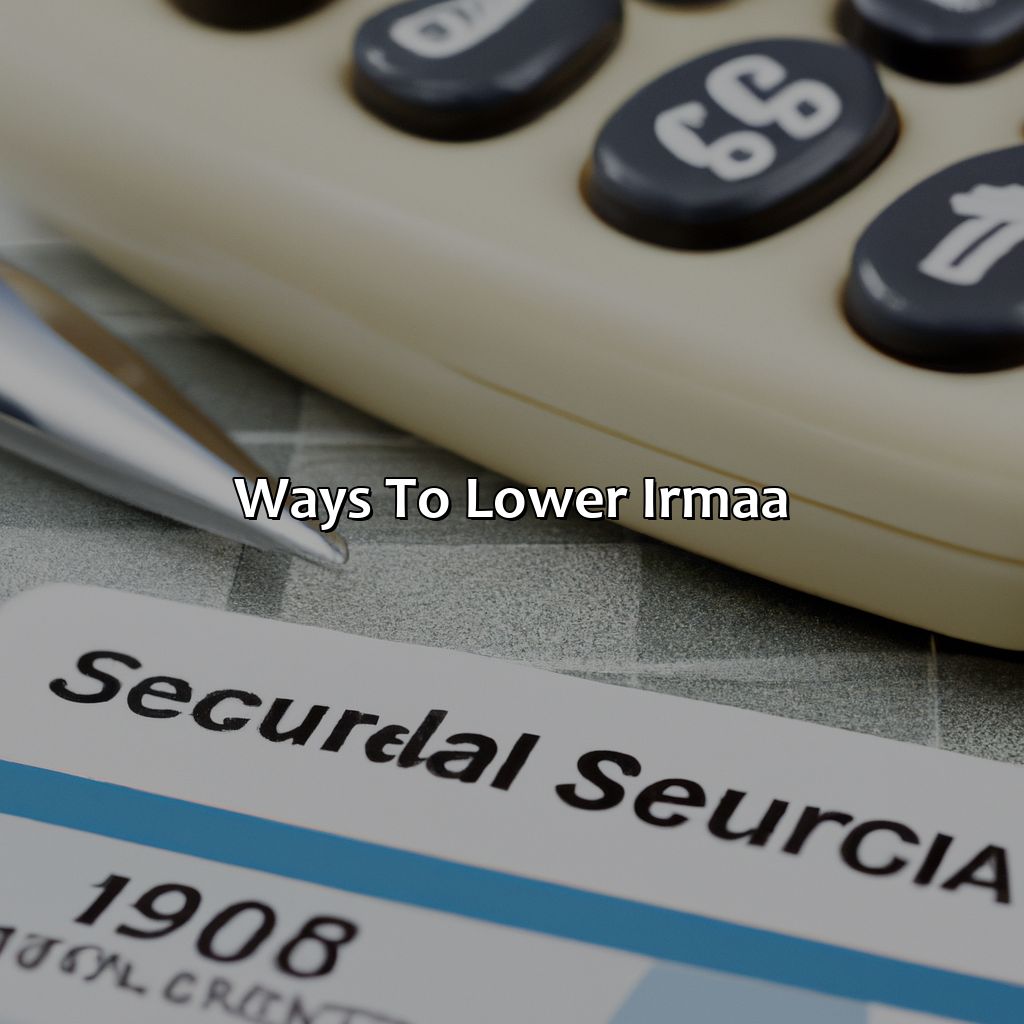What Does Irmaa Mean In Social Security?
Key Takeaway:
- IRMAA (Income-Related Monthly Adjustment Amount) is an additional charge on top of Medicare premiums that high earners have to pay for Part B and Part D coverage. It affects individuals with a modified adjusted gross income (MAGI) above a certain threshold.
- IRMAA has a significant impact on Social Security beneficiaries, particularly those who are already experiencing financial strain. It is important to understand how IRMAA is calculated and which beneficiaries are affected.
- To lower IRMAA, beneficiaries can employ income management strategies such as adjusting their retirement income sources or tax planning. If the determination is incorrect or outdated, appealing the decision can also be an option.
Have you been hearing a lot about IRMAA lately and wondering what it means for you? You’re not alone. IRMAA stands for Income-Related Monthly Adjustment Amount, and it can have a significant impact on your Social Security benefits. Read on to learn more about IRMAA and how it affects you.
What is IRMAA
IRMAA stands for Income-Related Monthly Adjustment Amount. It is an additional premium that high-income Medicare beneficiaries have to pay for their Part B and Part D coverage. The amount of IRMAA one has to pay depends on their Modified Adjusted Gross Income (MAGI). Individuals earning above a certain threshold will pay a higher premium than their counterparts with lower income. IRMAA is used to subsidize the cost of Medicare for those who cannot afford it. It is important for beneficiaries to understand the IRMAA structure to avoid surprises in their premiums.
High-income earners who do not plan adequately may end up with IRMAA surcharges they did not expect. It is important to plan your finances to avoid leaving room for such adjustments in your Medicare premium. The best way to do this is to consult a financial advisor and to keep track of your MAGI income. This can help you to avoid crossing thresholds and incurring higher IRMAA surcharges.
In some unique cases, IRMAA surcharges can be appealed and overturned. There are a number of reasons one can contest an IRMAA surcharge, including income changes because of marriage, divorce, or retirement. To appeal an IRMAA surcharge, beneficiaries need to complete and submit the necessary form to the Social Security Administration.
A recent case of IRMAA surcharge involved a beneficiary who had retired, but still had a high income due to a rental property. The beneficiary was paying an extra $200 monthly for the surcharge. Upon consultation with an advisor, they discovered they could deduct their expenses for the rental property and submit an appeal to have their MAGI adjusted. After submitting the appeal, the beneficiary was able to overturn the IRMAA surcharge and save themselves $200 per month.
In summary, IRMAA is an additional premium Medicare beneficiaries pay based on their income. It is important to have a clear understanding of IRMAA and to plan adequately to avoid surprising changes in your Medicare premium. While IRMAA surcharges can be appealed and overturned, it is essential to consult with a financial advisor before making any changes to your income or expenses.

Image credits: retiregenz.com by David Washington
IRMAA and Social Security Benefits
It’s vital to comprehend how IRMAA, the income-related monthly adjustment amount, alters Social Security benefits. This article will investigate IRMAA and its effects on beneficiaries. How is IRMAA calculated? Who is impacted by it? We will answer these questions and give you a more profound comprehension of this intricate issue.

Image credits: retiregenz.com by Joel Duncun
How IRMAA is calculated
Calculating IRMAA, or Income-Related Monthly Adjustment Amount, involves using the modified adjusted gross income (MAGI) reported on your tax return from two years ago. The Social Security Administration uses this information to determine whether or not you owe an additional amount on top of your regular Medicare Part B and D premiums. If your MAGI exceeds a certain threshold, you will pay an extra amount based on a sliding scale. This extra charge is calculated annually and deducted directly from your Social Security benefits.
Importantly, there are a number of factors that can impact how much you pay in IRMAA fees. For example, if you experience a decrease in income compared to what was reported two years prior, you may be able to appeal for a reduction in the IRMAA surcharge. Additionally, certain life changes such as marriage or divorce can also have an impact on how much you owe.
It’s worth noting that IRMAA fees didn’t exist until 2006 when the law was introduced as part of the Medicare Prescription Drug Improvement and Modernization Act. Since then, more and more people have found themselves facing these additional charges each year as their MAGI creeps above the threshold. Understanding how IRMAA is calculated is therefore an important consideration for anyone approaching retirement age who depends on Social Security benefits and wants to plan for their healthcare costs accordingly.
Looks like IRMAA is the new buzzword among Social Security beneficiaries – sorry, your monthly check just got an unexpected makeover.
Which beneficiaries are affected by IRMAA
IRMAA is an acronym that affects specific beneficiaries who receive social security benefits. These beneficiaries are those who have a high income which exceeds the threshold limit. IRMAA raises the amount of monthly premiums these beneficiaries owe for their Medicare health insurance.
Lowering IRMAA is like trying to avoid a hurricane – it’s easier said than done, but we’ve got some tips to help you weather the storm.
Ways to lower IRMAA
Want to lower your IRMAA? Want to manage your income and appeal IRMAA determination? Read on! Here are two great methods to reduce your Medicare premiums and save your retirement funds.

Image credits: retiregenz.com by David Woodhock
Income management strategies
Developing Effective Tactics to Reduce IRMAA Expenses
Reducing Income-Related Monthly Adjustment Amount (IRMAA) expenses is a significant concern for many Social Security beneficiaries who exceed certain income thresholds. Some effective tactics exist to reduce the impact on your benefits. Consider investing in tax-free financial vehicles and making after-tax contributions. Limit taxable withdrawals from your 401(k) or IRA accounts, and consider investment loss harvesting to offset some of your taxable gains.
To further lower your IRMAA costs, consider strategies such as utilizing health savings accounts (HSAs), Roth conversions, and delaying your enrollment in Medicare Part B or D. Working with an experienced financial advisor can also help you create a personalized roadmap that maximizes your benefits while minimizing IRMAA expenses.
Pro Tip: Be proactive and start planning early to maximize available options for managing IRMAA-related costs.
Appealing an IRMAA determination is like fighting a bear with a feather duster – but at least you won’t be charged extra for it.
Appealing IRMAA determination
Reducing the Potential Impacts of Increased Medicare Income-Related Monthly Adjustment Amount (IRMAA)
When faced with an IRMAA determination that may increase your Medicare premiums depending on your income, you can appeal the decision by submitting a Request for Reconsideration form with evidence to support your case. IRMAA determinations are based on tax returns from two years prior, which may not accurately reflect current circumstances such as a life-changing event, loss of employment or other qualifying situations.
It is important to gather all necessary documents and submit them promptly to avoid payment of increasing premiums before the reconsideration process is completed. Additionally, working with a financial advisor or social security representative could provide useful insight into avoiding future IRMAA increases.
Pro Tip: To prevent future IRMAA increases, consider using strategies to reduce income such as tax-deferred retirement account contributions or charitable giving.
Some Facts About What Does IRMAA Mean in Social Security:
- ✅ IRMAA stands for Income-Related Monthly Adjustment Amount. (Source: Social Security Administration)
- ✅ The IRMAA is a premium surcharge applied to Medicare Part B and D plans for higher-income beneficiaries. (Source: AARP)
- ✅ The IRMAA is calculated based on your previous two years’ tax returns. (Source: Medicare.gov)
- ✅ The IRMAA can increase your monthly Medicare premiums by as much as $347. (Source: The Motley Fool)
- ✅ There are ways to appeal an IRMAA determination, such as if you experience a significant life-changing event that impacts your income. (Source: Kiplinger)
FAQs about What Does Irmaa Mean In Social Security?
What does IRMAA mean in Social Security?
IRMAA stands for Income-Related Monthly Adjustment Amount. It’s a surcharge imposed by the Social Security Administration (SSA) on individuals with high income who enroll in Medicare Part B and/or Part D.
How is IRMAA calculated?
IRMAA is calculated based on your adjusted gross income and your tax-filing status from two years prior. For example, if you are enrolling in Medicare in 2021, the SSA will use your 2019 tax return to determine your IRMAA.
Who is affected by IRMAA?
Individuals who earn more than $88,000 per year or couples who earn more than $176,000 per year are subject to IRMAA surcharges for Medicare Part B and Part D.
How can I avoid paying the IRMAA surcharge?
To avoid paying the IRMAA surcharge, you can try to lower your income by contributing to tax-deferred retirement accounts, such as a 401(k) or traditional IRA. You can also consider converting some of your traditional IRA or 401(k) assets to a Roth IRA or Roth 401(k) to reduce your future required minimum distributions and taxable income
Can I appeal my IRMAA determination?
Yes, you can appeal your IRMAA determination by completing and submitting Form SSA-44 to the SSA. You will need to provide evidence that your income has gone down or that you qualify for a lower income bracket.
Can my IRMAA surcharge change from year to year?
Yes, your IRMAA surcharge can change from year to year depending on your income. The SSA will review your income each year and adjust your surcharge accordingly.


